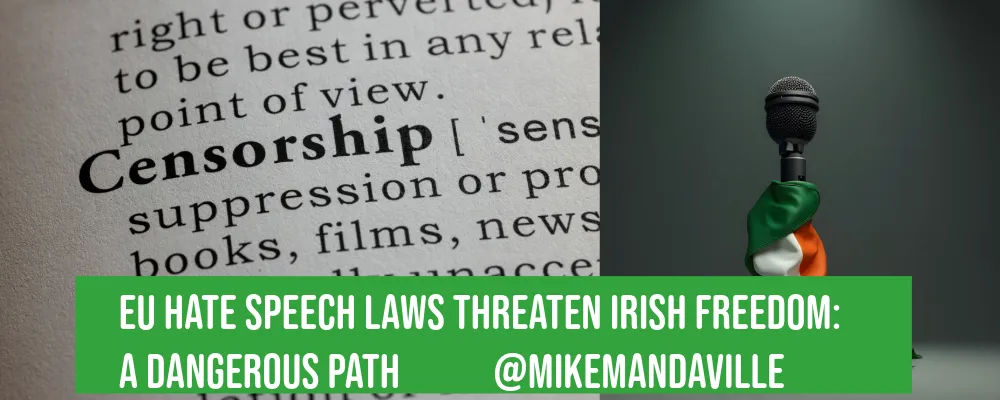CreativeExplorer-MichaelMandaville.com
I work in Film. I live in Martial Arts. I thrive in Imagination.
Filmmaking
Media, Film, Streaming, Story

Filmmaking
Filmmaking here with articles, tech, story and other stuff to learn, inspire and maybe piss you off as in "Why didn't I know that before!" Believe me, happens to me all day long. Always more to learn and strategize for greater success and Joy in this amazing filmmaking world. I enjoy action films but really good ones in what I like to call "Arthouse Action" which are films like "Die Hard", "Enemy of the State" and others with quick witted words coupled with quicker action. But make no mistake I prize and enjoy the Art of Cinema in many genres and eras.

EU Hate Speech Laws Threaten Irish Freedom
EU Hate Speech Laws Threaten Irish Freedom: A Dangerous Path
Imagine being told what you can and cannot say about the issues that deeply impact your life, your community, and your nation.
Hate speech laws, while often framed as mechanisms to protect vulnerable groups, have a darker side. They carry the potential to stifle free speech, suppress dissent, and erode the very freedoms foundational to a democratic society.
At their core, hate speech laws aim to regulate language and curtail expressions deemed harmful or offensive.
But what happens when the definition of "harmful" lies in the hands of those in power?
This is where the danger festers. History demonstrates that once governments are granted the ability to regulate speech, the line between "protection" and "oppression" becomes alarmingly thin.
The Thin Line Between Protection and Suppression
To many, hate speech laws seem like a small concession for the greater good. After all, who wouldn’t want to eliminate hateful rhetoric from public discourse? However, these regulations often carry unintended and far-reaching consequences. They create a dangerous precedent where governments can categorize certain ideas or opinions as "unacceptable." What starts as an effort to curb genuine hate can quickly evolve into silencing legitimate criticism, dissent, or alternative viewpoints.
Take Ireland. Under pressure from the European Union, Ireland has been told to implement stringent hate speech laws within two months or face legal action. On the surface, this may appear to be a needed measure against racism or xenophobia. But what happens when someone criticizes immigration policies or housing allocation? Does expressing frustration over governance suddenly become an act of incitement? These are not hypothetical scenarios but legitimate concerns about where such laws may lead.
Gerard Casey said, ““If you can’t express your biases or what others perceive as your biases or hatreds, then you’ve been pre-emptively gagged. You are at the mercy of those who get to determine what is and what isn’t hate speech where hate speech is simply whatever those who are given to censorship and have the power to censor find hateful!”
This is how the crackdown begins—not with a bang, but with a law.
Historical Precedents of Speech Suppression
There is no shortage of examples of governments abusing laws under the guise of protecting the public or maintaining order. Here are five prominent cases where speech suppression laid the foundation for widespread oppression:
Historical Examples of Oppression Through Speech Restrictions
1 The Soviet Union:
Under Stalin's regime, laws against "anti-Soviet agitation" were used to silence anyone who voiced criticism against the government. Dissidents, intellectuals, and ordinary citizens found themselves imprisoned or sent to labor camps for expressing opinions perceived as counter to the state's narrative.
• Soviet Union (1917–1991) The Soviet Union championed speech restrictions under the guise of protecting the state and preventing “counter-revolutionary” ideas. Article 58 of the 1927 Penal Code criminalized “anti-Soviet agitation,” a vague charge used to punish criticism of the regime, including speech deemed to incite hatred against the proletariat or the state. This led to the imprisonment, exile, or execution of millions, including intellectuals, dissidents, and ordinary citizens. The regime’s censorship apparatus, including the Glavlit agency, monitored publications and speech to enforce ideological conformity. Dissidents like Aleksandr Solzhenitsyn faced persecution for exposing the Gulag system, illustrating how speech laws silenced truth-tellers to maintain state control.
2 China:
The Chinese government has long maintained strict controls over free speech. Under the guise of preserving "social harmony," dissenters, journalists, and activists are routinely silenced. Platforms like WeChat actively censor messages critical of the government, and the Great Firewall blocks access to content deemed subversive.
• China (1949–Present) The People’s Republic of China has long used speech restrictions to suppress dissent, particularly under the Chinese Communist Party (CCP). Laws like Article 105 of the Criminal Law, which criminalizes “subversion” or “inciting subversion,” are broadly interpreted to target critics of the regime. The Great Firewall blocks online content deemed harmful, including discussions of democracy, human rights, or ethnic tensions. During the Cultural Revolution (1966–1976), “counter-revolutionary” speech led to public shaming, imprisonment, or death. Today, activists like Liu Xiaobo, who called for democratic reforms, have been jailed for “inciting subversion,” showing how speech laws protect the CCP’s monopoly on power while stifling debate on issues like inequality or minority rights.
3 Cuba:
Fidel Castro's regime criminalized speech against the socialist government, branding it as counter-revolutionary. Even today, Cuban citizens face imprisonment for voicing their discontent with the state. The crackdown on independent journalism ensures that the official state narrative dominates.
• Cuba (1959–Present) Following the 1959 revolution, Fidel Castro’s regime enacted laws to curb “counter-revolutionary” speech, framing dissent as a threat to national unity. Article 144 of the Cuban Penal Code criminalizes “insulting” state authorities, while Decree-Law 370 (2018) restricts online content that “undermines” the revolution. Independent journalists and bloggers face harassment, detention, or exile for reporting on economic crises, corruption, or human rights abuses. The regime’s control over media and speech has suppressed criticism of its handling of poverty and emigration, ensuring the Communist Party’s dominance while portraying dissenters as traitors.
4 Iran:
Anti-government protests and even minor criticisms of the regime are swiftly labelled as blasphemous or anti-Islamic and punished severely. The government uses laws against "spreading corruption on Earth" to imprison and execute individuals for what would be considered free speech elsewhere.
• Iran (1979–Present) Post-1979 Islamic Revolution, Iran’s regime has used speech laws to enforce Islamic morality and suppress political dissent. The Press Law and Penal Code criminalize “propaganda against the state” and “insulting sacred values,” with vague definitions allowing prosecution of journalists, activists, and social media users. The 2009 Green Movement protests, sparked by disputed elections, saw mass arrests of demonstrators and bloggers for “spreading lies.” Women advocating for rights, like those in the 2018 hijab protests, face imprisonment for “inciting corruption.” These laws silence debate on economic mismanagement, corruption, and minority rights, reinforcing theocratic control.
5 Zimbabwe:
Under the leadership of Robert Mugabe, hate speech laws aimed to clamp down on tribalism conveniently evolved into tools to silence political opponents. Protected speech, such as criticisms of government corruption, became criminalized under these overbroad definitions.
• Zimbabwe (1980–Present) Under Robert Mugabe’s rule and continuing under Emmerson Mnangagwa, Zimbabwe has used speech restrictions to suppress opposition. The Public Order and Security Act (2002) and its successor, the Maintenance of Peace and Order Act (2019), criminalize “spreading false news” or “inciting public disorder.” Journalists and activists, like Hopewell Chin’ono, have been arrested for exposing corruption or criticizing economic policies amid hyperinflation and food shortages. These laws have stifled dissent over land reforms, electoral fraud, and human rights abuses, enabling the ruling ZANU-PF party to maintain power despite widespread suffering.
The Chilling Effect on Political Discourse
The most insidious aspect of hate speech laws is their chilling effect. Even those who never intend to incite hate begin to self-censor, out of fear of repercussion. Imagine discussing Irish immigration policy, economic challenges, or cultural tensions while wondering if your words will land you in legal trouble.
When this fear trickles into society, public discourse is stifled. An open exchange of ideas is replaced by echo chambers of safe, state-approved narratives. Without debate, progress stalls, and governments face less accountability. The media, often a bastion of free speech, becomes constrained under laws aimed to regulate "misinformation" or "offensive content." Instead of watchdogs, the press becomes lapdogs.
The Irish government’s ongoing debate about implementing EU-mandated hate speech laws is a perfect illustration of this issue. While the EU pushes for legislation to criminalize public incitement to violence or hatred based on characteristics such as race or religion, there is unease among civil libertarians. Could criticism of public policy or cultural tensions be misconstrued as incitement? Could a vocal but non-violent opinion be prosecuted? The Irish Council for Civil Liberties has already raised concerns about the law’s potential to curtail valid expressions of dissent.
Erosion of Free Thought and Debate
Freedom of speech is not just about the ability to say what’s on your mind. It is the lifeblood of innovation, progress, and democracy. Free thought thrives in environments where individuals can challenge norms, question authority, and propose alternative ideas without fear of oppression.
When governments impose broad constraints on speech, they are not only regulating what can be said but also what can be thought. People grow accustomed to a narrow band of acceptable dialogue, and societies risk losing the ability to adapt or evolve.
Encouraging Debate, Not Censorship
Is hate speech a problem? Undoubtedly. But the answer is not to give governments unchecked power to decide what is and isn’t allowed to be said. Grassroots efforts, education, and community initiatives can often counter hateful rhetoric more effectively than legislation.
Instead of silencing voices, we should encourage open dialogue. Providing platforms for honest and respectful discussions fosters understanding, countering the division that hate speech laws aim to address. The key lies in empowering citizens, not punishing them.
Final Thoughts
To those who value freedom, be vigilant. Hate speech laws, no matter how well-intentioned, carry the seeds of tyranny. Today, they may target speech you disagree with. Tomorrow, they may be aimed at you.
The Globalist Gombeens like Martin, Harris, McEntee, Richmond and more prefer to silence questions like the recent scenario with GriptMedia where a Marxist Coppinger bloated with self-importance dismissed their questions.
It is essential to advocate for solutions that address hate speech without compromising the fundamental liberties that define us as free societies. Debate, discussion, and dissent are what make democracies thrive. They are messy, yes, but they are necessary.
George Orwell said, “If large numbers of people believe in freedom of speech, there will be freedom of speech, even if the law forbids it. But if public opinion is sluggish, inconvenient minorities will be persecuted, even if laws exist to protect them.”

